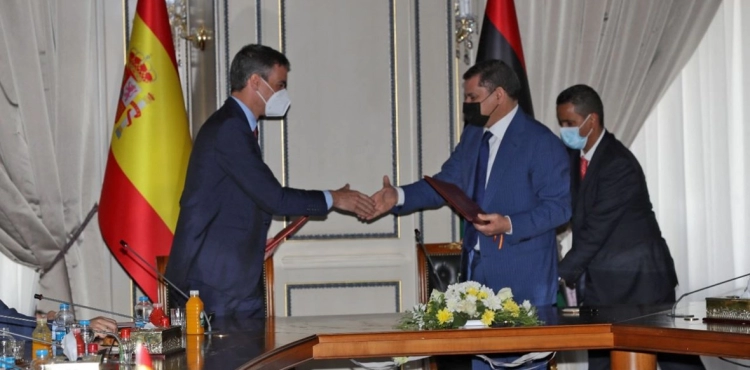Libyan Prime Minister Abdel Hamid Dabaiba and Spanish Prime Minister Pedro Sanchez signed in Tripoli, Thursday, bilateral memoranda of understanding during a visit that also witnessed the restoration of work at the Spanish embassy in Libya.
The Spanish Prime Minister arrived in the Libyan capital, accompanied by a delegation of businessmen, on a visit preceded by the influx of a number of European officials to Libya, in support of the new political authority that was established in the country after a decade of chaos.
The Libyan Prime Minister said in a joint press conference with his Spanish counterpart: "We concluded a number of memoranda of understanding, especially in the field of vocational and health education, investment and trade development between the two countries."
He added, "We value Spain´s role in strengthening border security and supporting elections, and we thank it for cooperating in recovering Libyan artifacts" that escaped following the chaos that swept the country starting in 2011.
Spanish businessmen held a meeting with a number of Libyan businessmen and officials earlier Thursday to discuss Spain´s role in the "reconstruction of Libya."
The Spanish Prime Minister told reporters: "We want to contribute to the reconstruction, and there will be cooperation in the areas of health, infrastructure and reconstruction, after we signed several memoranda of understanding."
He added, "We are pleased to announce the reopening of our embassy in Tripoli, and we will provide consular services and grant visas, to be (...) alongside Italy among the European countries that grant a visa to Libyans."
The Spanish Prime Minister also affirmed support for the ceasefire and the upcoming elections at the end of this year, in addition to stressing Madrid´s keenness to help Libya build its "democratic path."
Dabaiba is considered one of the most important and prominent businessmen and economists in Libya, and he had extensive relations during the rule of the late Colonel Muammar Gaddafi´s regime.
Spain has an economic presence in Libya, especially through the oil group Repsol.
Last Tuesday, officials from the Spanish company held a meeting (via video technology) with Mustafa Sanalla, head of the Libyan National Oil Corporation, to discuss ways to boost renewable energy in the country.
In Libya, a ceasefire agreement was signed last October, and a unified government headed by Abdel Hamid Dabaiba was formed, at the conclusion of a UN-sponsored political process approved by Parliament in March.
According to the roadmap that allowed the appointment of Dabaiba from (the West) as prime minister and the establishment of a presidential council headed by Muhammad al-Manfi from the (east), the new authority must unify the institutions to get the country out of conflict and lead a transitional period until the elections are held at the end of next December.
H-ND/M R












